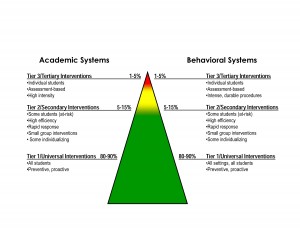Under the current austerity regime forced on school districts by lack of tax revenue, imagining a more equitable school system that respects individuals may seem out of step with the business oriented forces at work in U.S. education policy. But Shelley Jensen thinks there is no time like the present to address the ills served upon our nation’s students by the unexamined assumptions that rationalize school accountability. These assumptions, Jensen says, translate into blame and punishment of schools and teachers, a regime of summative assessments, and the testing of virtually every student, every year, in every content area, whether the tests serve a useful purpose to individual students. The new emphasis on testing is justified by the goal of identifying school level effects, she says, which are then used to label schools with the epithet “failure.”
Jensen, a doctoral candidate in Educational Methodology, Policy, and Leadership in the University of Oregon College of Education, is working on a dissertation proposal that compares and analyzes state policies for school and accountability and assessment. Using discourse analysis, “the application of critical thought to social situations and the unveiling of hidden (or not so hidden) politics within the socially dominant” (University of Texas, 2011) and drawing on Jacques Derrida’s dualism and deconstructive analysis of texts (1976) and Michel Foucault (1972), she has interrogated the history of education policies and more recent documents including A Nation at Risk (National Commission on Excellence in Education, 1983), materials created by the Department of Education in support of the reauthorization of Elementary and Secondary Education Act (“No Child Left Behind Act of 2001,” 2002), and President Obama’s A Blueprint for Reform: The Reauthorization of the Elementary and Secondary Education Act (U.S. DOE, 2010).
Relying on Kant’s explanation of the theory of action (McCarty, 2009), she has hypothesized a (masculinist/feminist) dichotomous sort of maxims, terms, and concepts of educational policy that she uses to first define a mechanistic/structural theory of action that is lately dominant in federal and state education policies and then to construct a hypothetical alternative, a humanistic/organic theory of action. This dichotomous sort of terms and concepts (Table 1) is the basis of a scoring rubric with which to evaluate state policies for school accountability and assessment, which will guide her dissertation study, if her proposal is approved.
In “One Size Does Not Fit All: A New School Accountability Paradigm” (Jensen, S. J., paper presented at the 2011 American Education Research Association Annual Meeting), she explored the application of a humanistic/organic theory of action to the reform of education policies to emphasize true opportunity to learn, more than access to the content being assessed on high-takes tests, that is, equitable school facilities (Kozol, 2005). Ms. Jensen is available to local groups to present a PowerPoint talk that explains this new approach to educational policy that uses the common core standards yet is child centered. Her research promotes optimal outcomes for each student using Response to Intervention (Figure 1) practices, and replacing the diploma denial process of exit exams to add certificates of mastery to diplomas to certify preparation for college.
Contact Shelley Jensen at: sjensen5@uoregon.edu
Publications
2011 One Size Does Not Fit All: A New School Accountability Paradigm—presented at the American Educational Research Association Annual Conference in New Orleans
In progress “The Ruling Ideas in the Textbook”—a chapter of The New Politics of the Textbook under contract with Sense Publishers; editors: Heather Hickman and Brad J. Porfilio
In progress Chapter of Dangerous Counterstories in the Corporate Academy under contract with Information Age Publishing; editors: Emily A. Daniels and Brad J. Porfilio
Resources
Derrida, J. (1976). Of grammatology. Baltimore: Johns Hopkins University Press.
Derrida, J. (1978). Writing and difference. Chicago: University of Chicago Press.
Foucault, M. (1972). The archaeology of knowledge. New York: Pantheon Books.
Jensen, S. J. (2011). One Size Does Not Fit All: A New School Accountability Paradigm Paper presented at the 2011 American Education Research Association Annual Meeting.
Kozol, J. (2005). The shame of the nation: the restoration of apartheid schooling in America. New York: Crown Publishers.
McCarty, R. (2009). Kant’s theory of action. Oxford; New York: Oxford University Press.
National Commission on Excellence in Education. (1983). A Nation at Risk: The Imperative for Educational Reform. Washington, D.C.: U.S. Department of Education.
No Child Left Behind Act of 2001, 20 U.S.C. § 1119 (2002).
U.S. DOE. (2010). A Blueprint for Reform: The Reauthorization of the Elementary and Secondary Education Act. Retrieved from http://www2.ed.gov/policy/elsec/leg/blueprint/blueprint.pdf.
University of Texas. (2011). Discourse Analysis. Retrieved July 21, 2011, from http://www.ischool.utexas.edu/~palmquis/courses/discourse.htm



